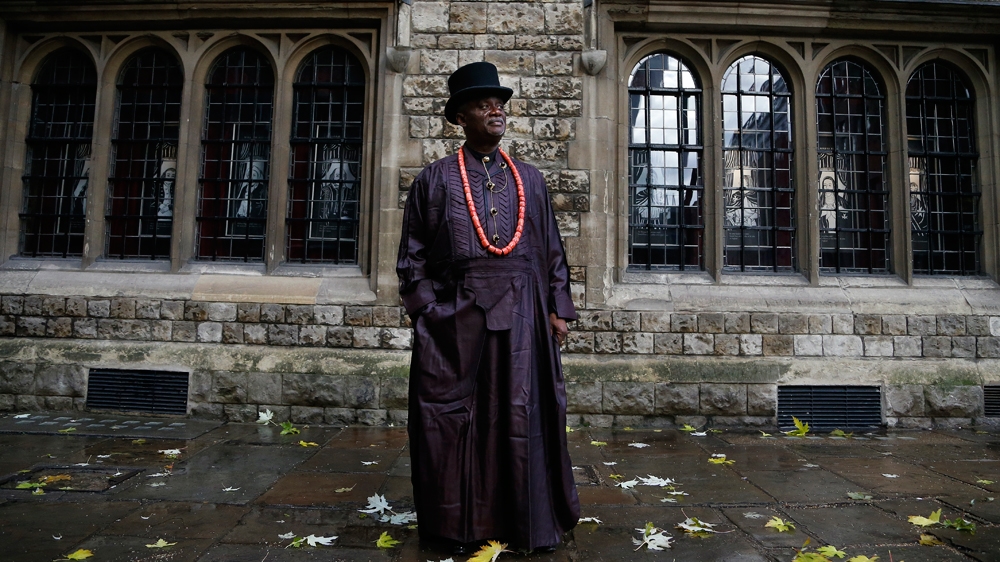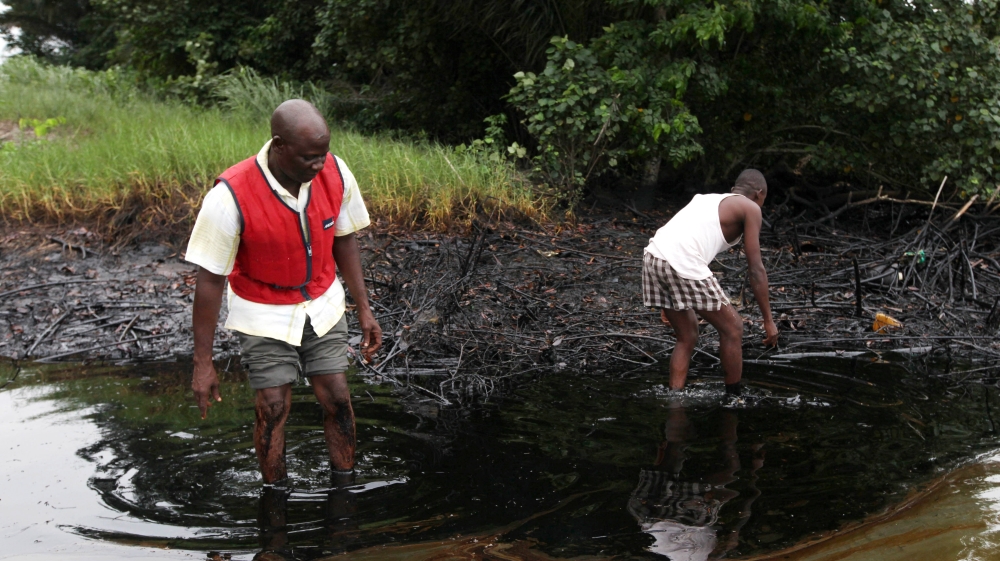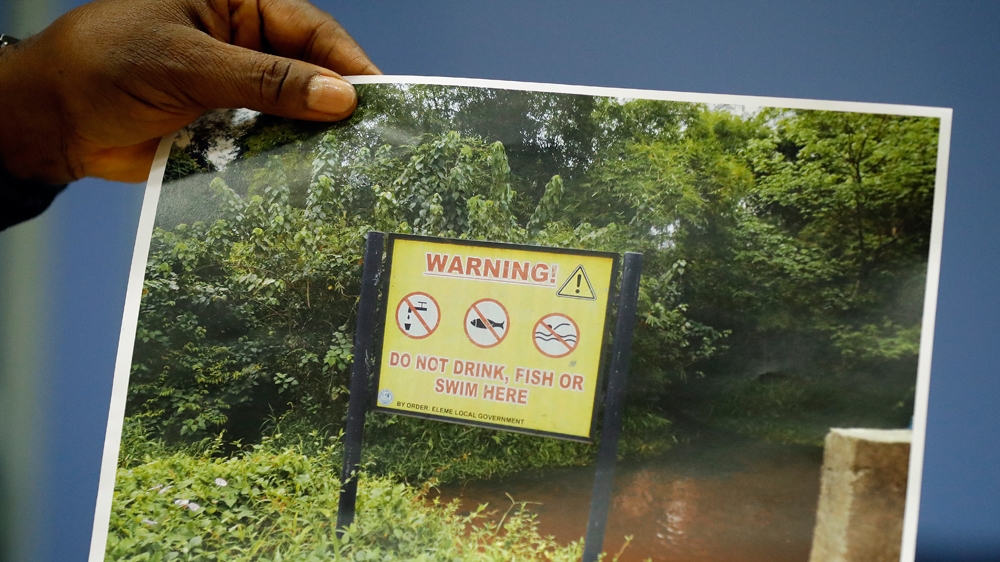A British court has blocked pollution claims against
Anglo-Dutch energy giant Shell by many residents of Nigeria's Niger Delta
region demanding action over decades of oil spills there.
Shell not responsible for 'decades of oil spills' in Nigeria?
Members of the Ogale and Bille communities, who say
thousands of lives have been devastated by environmental disasters from the
global company, had applied for the case to be heard in Britain, arguing that
rampant corruption in their home country prevents them from achieving justice
in courts there.
But the High Court in London on Thursday said
that it did not have jurisdiction in the case, ruling that it should be settled
in Nigeria.
The High Court ruled on Thursday that Royal Dutch Shell cannot be held responsible for the actions of its Nigerian subsidiary, Shell Petroleum Development Company of Nigeria Ltd. This is despite the company having profited from decades of abuses and environmental destruction in the Niger Delta. The communities are expected to appeal.
“The Ogale and Bille communities have been hit by multiple Shell spills, threatening their health and drinking water. The UN found groundwater contamination in Ogale was more than 450 times the legal limit – when Amnesty investigators went back four years later, Shell still hadn’t cleaned up the pollution. This ruling could mean that the communities will never receive meaningful compensation, and that the oil spills will be not be properly cleaned up,” said Joe Westby, Campaigner on Business and Human Rights at Amnesty International.
“This ruling sets an especially dangerous precedent. If it stands, then the UK Courts have given free rein to multinational companies based in the UK to abuse human rights overseas. Poor communities and developing countries will pay the price. This is a deeply depressing reminder of the impunity enjoyed by powerful corporations, and a blow to other communities in the Niger Delta who are still awaiting justice.
“We hope and expect that the court of appeal will overturn this decision to show that the UK justice system will provide remedy to impoverished communities who suffer serious abuse caused by UK corporations.”
Two Nigerian communities brought separate legal actions against Royal Dutch Shell and its Nigerian subsidiary in 2016. The first claim was brought on behalf of 2,335 people from the Bille Kingdom, a fishing community whose environment has been devastated by oil spills over the past five years.
The second claim was on behalf of the Ogale Community in Ogoniland which consists of around 40,000 people. Over several years there have been repeated oil spills from Shell’s pipelines in Ogoniland which have still not been cleaned up.
Evidence presented before the court and Amnesty International’s years of experience working on the issue show that Royal Dutch Shell, an Anglo-Dutch company, has significant direct involvement with its Nigerian subsidiary. However, Shell disputed the jurisdiction of the UK court, arguing that the case concerned Nigerian plaintiffs and a Nigerian company.
The judge today struck out the claims against Royal Dutch Shell and its Nigerian subsidiary, but gave the communities permission to file an appeal.
“The judge’s decision is blatantly at odds with how multinationals like Shell work in today’s globalised world. Too often they hide behind the legal fiction that their subsidiaries operate completely separate to them. If multinationals are allowed to reap profits from their companies around the world without being held responsible when they commit human rights abuses, then abuses can – and will – take place,” said Joe Westby.
Communities affected by oil spills in Nigeria are usually forced to negotiate directly with the company and are at a huge disadvantage, which invariably means they are cheated. For rural communities taking a claim to the Nigeria courts is extremely difficult because only federal courts can deal with oil cases and few lawyers are willing to take on the major oil companies. The rare cases that do make it to court languish for years in the Nigerian justice system with no resolution.
In January 2015 a UK law firm won a landmark settlement agreement from Shell to pay £55 million to the Bodo community in Niger Delta after the case was brought to the UK court. Shell had originally offered just £4,000 compensation. As part of these legal proceedings Shell was forced to admit it had understated – for years – the size of the oil spills. Only the UK court process was able to bring this to light.
“It is shocking that Shell is trying to deny it is responsible for its 100% owned subsidiary. Shell has profited from decades of human rights abuse and environmental damage in the Niger Delta and both Royal Dutch Shell and Shell Nigeria should be held legally accountable,” said Joe Westby.
Background
In 2011 the United Nations Environment Programme (UNEP) documented the appalling environmental damage and oil pollution in Ogoniland. Its study described public health as seriously threatened by oil spills and said that environmental restoration of the area could prove to be the world’s most wide-ranging and long term oil clean-up exercise ever undertaken.
At the time, Shell stated it accepted the findings and the recommendations of the UNEP Report. However, a 2015 investigation by Amnesty International revealed that claims by Shell that they had cleaned up heavily polluted areas were blatantly false. Researchers observed ongoing oil pollution at four locations where UNEP found contamination – including Okuluebu in Ogale, one of the sites included in the legal claim. The Nigerian government regulator certified the area as clean in 2012, but researchers saw patches of black oil covering the ground and observed a strong smell of petroleum.
Shell sued in UK for 'decades of oil spills' in Nigeria
More than 40,000 Nigerians demand action from Shell to clean up oil spills that have devastated communities for decades.
The Nigerian water is contaminated with oil and cancer-causing compounds such as benzene. It is what his people drink every day.
Lawyers for more than 40,000 Nigerians are demanding action from Shell to clean up oil spills.
Britain's High Court began hearing lawsuits on Tuesday filed by the Ogale and Bille people alleging that decades of oil spills have fouled the water and destroyed the lives of thousands of fishermen and farmers in the Niger River Delta, where a Shell subsidiary has operated since the 1950s.
They brought their fight to Shell's home base because they say the Nigerian courts are too corrupt.
"Let the shareholders of Shell who are residents of the advanced world, like Britain, let them see a representative of a kingdom that is being destroyed for them to have money," he told The Associated Press news agency on the eve the hearing. "That's blood money."
 |
| Lawyers for more than 40,000 Nigerians are demanding action from Shell to clean up oil spills [Frank Augstein/AP] |
London law firm Leigh Day is handling the cases after it won a landmark agreement from Shell to pay $83.5m in compensation to the Bodo community for damage caused by oil spills in 2008 and 2009.
Shell originally offered $50,000 before the Bodo took their case to the same UK court.
The new lawsuits were brought by two communities located in Ogoniland, part of the oil-rich southern Niger River Delta.
They want to hold Shell, incorporated in the UK, responsible for the actions of its Nigerian subsidiary, Shell Petroleum Development Company of Nigeria Ltd, or SPDC.
The subsidiary said it has produced no oil or gas in the region since 1993.
The area is heavily affected by crude oil theft, pipeline sabotage and illegal refining.
It is arguing in court that the legal challenge is speculative and full of "legal and evidential weaknesses".
"If the claimants' lawyers are correct as to the existence of this novel duty of care, [Shell] and many other parents of multinational groups will be liable to the many hundreds of millions of people around the world with whom their subsidiaries come into contact in the ordinary course of their various operations," the company said in its court argument.
"That would constitute a radical if not historic expansion of the law and open the floodgates to litigation on an unprecedented scale."
The Ogale and Bille communities account for only a small portion of the millions of Nigerians that human rights activists say have been injured by contamination they say would never have been allowed in the home countries of the multinational oil companies that operate in partnership with the Nigerian government.
 |
| Claimants brought their fight to Shell's home base because they say the Nigerian courts are too corrupt [Sunday Alamba/AP] |
In the 1990s, the military government sent armed troops to put down protests by the Ogoni people, turning the oil-producing south into a war zone.
One of the leaders of those protests was Ken Saro-Wiwa, a writer and environmental activist whose opposition helped stop Shell's production in Ogoniland.
He and eight others were hanged by the government of military dictator Sani Abacha in November 1995 in a case the US condemned.
The new lawsuits come at a time when Shell is pivoting towards other areas, such as Brazil.
It recently bought BG Group Plc for $52.4bn, increasing its proven reserves of oil and gas by 25 percent. And like other oil companies, it is also slashing jobs and postponing investments to adjust to lower oil prices.
But Shell is still seen as having deep pockets, said David Elmes, course director of the Warwick Business School's Global Energy Research Network.
 |
| Shell originally offered $50,000 before the Bodo tribe took their case to the same UK court [Frank Augstein/AP] |
And as Shell looks to move to other countries, "people who feel they have a case against the company are looking to take action now", he said.
In a 2011 report, the United Nations said in at least 10 communities in Ogoniland, public health was "seriously threatened" by drinking water contaminated with hydrocarbons.
In one area, the water contained the carcinogen benzene at levels 900 times higher than what the World Health Organization says is safe.
While the report recognised that oil production in the region had ceased, it criticised Shell's oversight of the remaining facilities.
He brought the bottles of water to his lawyer's office in London just to make the point.
Removing his hat and leaning forward, he argued that his people have been made poorer by the destruction of an ecosystem.
He is angry at Shell, arguing it called the shots for its Nigerian subsidiary and so should be held accountable in Britain.
"My system cannot give me justice," Okpabi said. "There is only one place that can give me justice. That is why I am here."
Source: AP

No comments:
Post a Comment